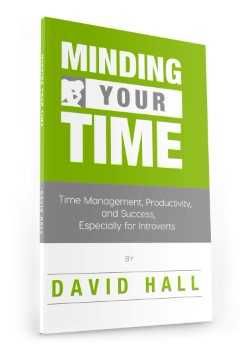Introversion
Balancing Your Time and Energy as an Introvert
Gain practical tips on time management, productivity, and success.
Posted March 3, 2018

Do back-to-back meetings, conferences, and crowded, noisy networking events drain your energy? How can you maintain your balance if you're an introvert? David Hall has the answers in his new book, Minding Your Time: Time Management, Productivity, and Success, Especially for Introverts. In my interview with him below, he shares time management techniques geared for introverts.
NA: Would you share a little about your journey as an introvert?
DH: I used to compare myself to others, and wondered why they were one way and I was another. I came across the term “introvert” and realized this fit. At first, I tried hard to change who I was, thinking that being an introvert was somehow less desirable than being an extrovert. But trying to be something I was not didn’t work for me.
Over the years, I have learned that introversion isn’t something I can change, nor is it “less than” anything. In fact, it’s really not about a label at all. It’s about understanding yourself, what your strengths are, and what you need to be successful. For example, I naturally do a lot of thinking, I usually think before speaking, and I do best with a little solitude each day.
As I learned more about introversion, and came to better understand what that means for me, I have learned to embrace it!
NA: That’s great. So you've clearly discovered many upsides to introversion.
DH: Definitely! I’ve found that with introversion comes exceptional skills and abilities. For me, some of these strengths include the ability to think deeply and analyze the big picture. And I’ve learned that by focusing on your own unique strengths, you’re able to accomplish more and be more successful.
NA: Why did you write this book?
DH: I have studied many resources on time management and productivity and have not come across many specifically written for introverts. Most time management books offer general tips, but fail to address introverts’ specific needs. So, I’m sharing the specific actions that have helped me become better at minding my time. All introverts are different, but most have some common needs when it comes to time management and productivity.
NA: Certainly, introverts need more time to gather their thoughts and recharge between social events to bring out their best. How does that apply to time management tips for introverts?

DH: When we are drained, it’s hard to do our best work. As an introvert, you need to know what activities or situations drain you, and how to recharge. When you understand your energy needs and how to work with them, you can build some recharge time into your plan for each day to help you stay energized and at the top of your game.
NA: Would you give examples of that?
DH: At that social event when you are feeling drained, a short walk outside may be the recharge you need. Or maybe you can cut your stay short and leave early. Whether it is a break or cutting the time short, or some other strategy, what will help you stay energized? In Minding Your Time, I help you work through understanding and caring for your needs. I show you how to schedule time into your day to keep you energized and efficient, instead of drained and overwhelmed.
When it comes to events, it can also be beneficial to prepare some talking points that you anticipate to cut down on the on-the-spot thinking. As introverts, we think and then speak. Of course, it’s not possible to prepare for everything, so sometimes you just need to relax and say, “let me think about that.”
NA: That’s one of my favorite lines! Would you say more about how you figure out what you need as an introvert?
DH: Every introvert is unique, and understanding your needs can make you strong. As introverts, we are masters of self-reflection. You can use this skill to think about your ideal day or ideal week, what events you want to avoid (things that drain you), activities you enjoy (things that you are good at or energize you), and you can also keep a journal of what makes you feel strong, and even what weaknesses you would like to address. I have some specific action steps in my book to help guide you through this process.
NA: What needs do introverts have that make time management so essential for them?
DH: Introverts definitely have some specific needs that are different from those of extroverts. We may be gifted thinkers or deep feelers, but as introverts, we all need some alone time to think, and time to clear our minds. If we spend too much time in an environment where our thinking or emotions are strained, we will not be effective – and this can be draining. We need to take time to plan, and time to reflect to avoid overwhelm so we are able to use our time more efficiently.
NA: Right. I think it’s also important to note that introverts aren’t necessarily better at planning – but it enables them to do their best at many types of meetings, job interviews, negotiations, and when facilitating presentation Q&As in which they have to react quickly.
DH: Yes, and by understanding how you work best as an introvert and addressing your specific needs, you are better able to handle the many situations you face each day with confidence and competence.

NA: What is a specific tactic that can benefit introverts in managing their time and energy?
DH: We often do best when we can think ahead of time and prepare for certain activities, such as a presentation or meeting. Prioritizing your time and scheduling “appointments with yourself” to focus on specific tasks or prepare for upcoming events is one example of how an introvert might have different time management needs from an extrovert, who can just “wing it.”
NA: What strengths do introverts versus extroverts have in the realm of time management?
DH: With a little time to think, introverts can come up with brilliant ideas. Introverts often do their best work by letting ideas roll around their head for a while and letting the ideas come together in amazing ways. This can take some planning. It is not to say that introverts can’t come up with great ideas on the spot, because they undoubtedly can. But often where introverts shine is allowing those ideas time to form into genius.
NA: Would you give an example of that in the realm of giving a presentation?
DH: Sure. For an introvert, a big part of giving a presentation is preparing ahead of time, so you’re not trying to think on the spot. For example you might spend time pondering such things as “Who is your audience?” “What are the key points that you want to drive home?” Or “How can I best present this material?” By spending time to analyze your audience and prepare a crafted message, your presentation can be strong and on point, so you can communicate with confidence.

NA: Right. It starts with self-reflection – knowing yourself. With that as a starting point, how do you handle "open-door" policies at work as an introvert who cares about visibility?
DH: In many work environments, it’s critical to be available to colleagues, managers, and clients. However, in order to keep projects moving forward, you may need quiet time to focus. If you have a door, you may need to close it sometimes. But it’s important to find the right balance of availability and time to focus during your work day.
NA: How do you manage the optics around the closed door?
DH: The key is to communicate. You might say “I’m going to close my door while I work on....” Let colleagues know that if they need you, they can knock, send an instant message, or whatever your preference is. And for those without a door, seek out a quiet place you could use from time to time so you can focus.
NA: What workarounds do you suggest for introverts in organizations that expect their employees to multitask well?
DH: As busy people, we always have a lot to juggle. But starting and stopping constantly is not effective. Multitasking can make your work take longer and your accuracy may suffer. As you look at your workload or the workload of those you lead, where can you provide focus? Can you schedule in some uninterrupted time to focus on specific projects? Can you provide focused work time for those you lead? This will be different for everyone depending on the individual and their type of work, but being aware of the need for focus can help you identify strategies to enable your organization to run more effectively.

NA: One strategy you mention for introverts to avoid feeling overwhelmed is making a regular daily appointment with yourself at the beginning of each day. Would you say more about how you make that work?
DH: I block off the first 90 minutes of each day to plan out my daily or weekly activities, prepare for upcoming meetings, and research and reflect on my work. My days can fill up with meetings fast, so this often protects me from meetings first thing in the morning – because time is already blocked out on my schedule. Of course, I am flexible, as needed. This first 90 minutes gives me time to think about what I need to do for the day, get organized, and plan accordingly. I can also focus on important projects. There may be time later, but I often find that unexpected things occur throughout the day and this first “appointment” helps me prepare and better manage the unexpected.
NA: Is there anything else you would like to add?
DH: Introverted gifts aren’t always readily apparent, but once you identify and embrace what makes you special, and arrange your schedule to take advantage of your gifts and address your needs, you can be more efficient, effective, and energetic. While you may not have the gift of “winging it” or other extroverted gifts you might see in a colleague, you can absolutely be successful by understanding your own introverted needs and embracing your strengths.
NA: It sounds like it all ties back to knowing yourself and your strengths.
DH: Yes, whether you are introverted or extroverted, you will do your best work and be successful when you know your strengths and your needs. I designed my book for introverts, but extroverts can benefit from general time management strategies – or may find it helpful to understand the strengths and needs of the introverts in their lives. When it comes to time management and productivity, let’s not employ a one-size-fits-all strategy, but consider the differences in personality types and what each person needs.
NA: Thank you, David, for raising our awareness about strategies to thrive in the work world, as an introvert, when there never seems to be enough time!
Copyright © 2018 Nancy Ancowitz




